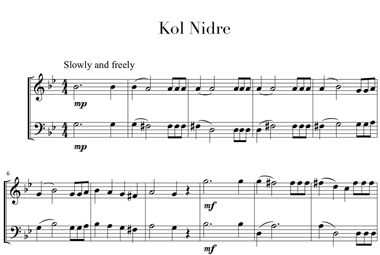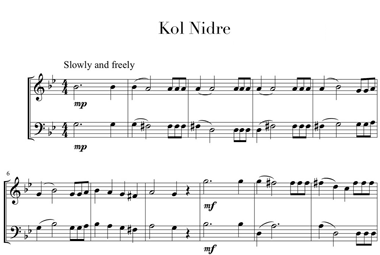Melancholy Melody
Kol Nidre gets me every time




Fasting, repentance, getting inscribed in the book of life: these are all important aspects of Yom Kippur. But for me, it’s all about the music.
I stopped doing most of the things that Jews are supposed to do—going to synagogue, studying the Torah, not preparing shellfish dishes for Friday night dinner (I’d suggest the moules marinière, The Way to Cook, p. 120)—a long time ago. And God only knows how long it’s been since I entertained the idea that He/She/It might actually exist. But Yom Kippur still rings my chimes, mostly because of Kol Nidre. The melody alone has an almost Pavlovian effect on me: all it takes is a bar or two, and I swing into full-blown contemplation mode, complete with a detailed review of my personal failings over the past year.
This has nothing to do with the Aramaic text, which is all about the nullification of unfulfilled vows between man and God. When it comes to words, it’s the viddui—the confessional prayer that follows the Kol Nidre—that really hits home. Reading through that laundry list of sins, of betrayal and slander, perversion and arrogance, I can’t help but notice how many I’ve committed, how many people I’ve wronged. Ever the eager beaver, I inevitably use the viddui to catalog my own transgressions in an effort to improve upon last year’s performance.
Yet the melody of the viddui makes absolutely no impression on me whatsoever. In fact, I can’t even recall it at the moment; whereas all I have to do is think the words “Kol Nidre,” and, whammo, the melody begins to play inside my head, bringing with it a feeling of sobriety that borders on depression. Somehow, through one of those tricks of memory from which we all suffer, I have managed to link the sound of the Kol Nidre with the deep-seated feelings of guilt inspired by the viddui. Hear one, feel the other. (Explain that, Oliver Sacks.)
This probably has something to do with the nature of the Kol Nidre melody itself. No one really knows where it originated. The text has been traced to eighth-century Babylonia—it may be related to the magical incantations that both Jews and non-Jews used at the time to ward off evil spirits—and the chant contains traces of everything from medieval German love songs to Haftarah tropes. But the earliest notated melody dates only to 18th-century Germany. We like to think of the Kol Nidre and many of the other High Holiday melodies as being misinai—so old they date back to the covenant at Mount Sinai—but we really haven’t a clue.
Yet no one doubts the power of those strangely affecting phrases, with their curious up-and-down, sighing-and-sobbing contours. The German Jewish philosopher Franz Rosenzweig changed his mind about converting to Christianity after hearing the Kol Nidre in Berlin in 1913. Upon leaving Buchenwald, Reb Leizer of Czenstochow is said to have trawled the Polish countryside for orphaned Jewish children by playing the Kol Nidre on a hand organ in public places; whenever he saw signs of recognition—of longing, or sadness—on the faces of passing kids, he knew that he had struck pay dirt. And the Hungarian poet Nikolaus Lenau, who was not himself Jewish, found the melody so moving (“a song draped with the veil of grief”) that it caused him to weep uncontrollably, leaving his spirit “torn and purified.”
But to be honest, I don’t know why the Kol Nidre melody has such an effect on anyone, let alone me. Yes, it announces the onset of the most solemn day in the Jewish calendar. But so what? That day surely never meant anything to Lenau, and it long ago lost most of its sacred character for me. Yet hearing that chant invariably pulls me back into something that, for the remaining 364 days of the year, I am reasonably certain I’ve rejected. And it’s more than likely that this Yom Kippur Eve, I’ll find myself wandering by my local synagogue, hoping to catch a few strains of something I could hear in full if only I were willing to shell out the $150 for High Holiday tickets. If a contemporary tunesmith could recreate that musical magnetism, he’d make a fortune—though maybe only off the backs of those twisted enough to pay for a song that makes them feel bad about themselves.
Never mind the vows. If I could just free myself of this kosher earworm, I’d be one happy sinner.
Alexander Gelfand is a recovering ethnomusicologist, a sometime jazz pianist, and a former West African drummer. His work has appeared in the New York Times, the Chicago Tribune, the Forward, and elsewhere.
Alexander Gelfand is a recovering ethnomusicologist, a sometime jazz pianist, and a former West African drummer. His work has appeared in the New York Times, the Chicago Tribune, the Forward, and elsewhere.